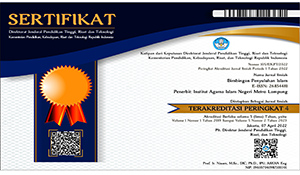KOMUNIKASI PENDIDIKAN SEKS BAGI REMAJA PADA KELUARGA MUSLIM DI KELURAHAN PEGATAN HULU KECAMATAN KATINGAN KUALA
Keywords:
Family Communication, Sex Education, YouthAbstract
Free sex behavior and sexual violence against children that occur in the community become public anxiety, especially in Pegatan Hulu Village, Katingan Kuala District, Katingan Regency, Central Kalimantan Province. It has a very negative impact on many aspects of life, not only on families but on teenagers, such as dropping out of school, contracting infectious diseases and leading to death. So it is necessary to communicate sex education in order to avoid the occurrence of free sex behavior in adolescents today. This study aims to determine the communication of sex education for adolescents in Muslim families in Pegatan Hulu Village, Katingan Kuala District. This study focuses on family communication, family approach, the communication process when educating about sex education in adolescents, barriers to sex education communication. This research used a qualitative method with a phenomenological approach. The theory used is the theory of sex education from the BKKBN, the theory of family communication developed by McLeod and Chaffee, communication in Islam and the theory of barriers to communication processes as analytical tools in research. Then the data collected is based on the results of interviews, observations and documentation conducted in Pegatan Hulu Village, Katingan Kuala District. The results of this study indicate that the communication process of Muslim family sex education in the Pegatan Hulu Village, Katingan Kuala District is still based on the cultural norms of the community that consider sex education to be too vulgar to discuss sexuality issues. At this level the discussion about sexual communication in Muslim families is only limited to observing children about the importance of avoiding promiscuity, not yet touching open discussions regarding the function and health of reproductive organs.






